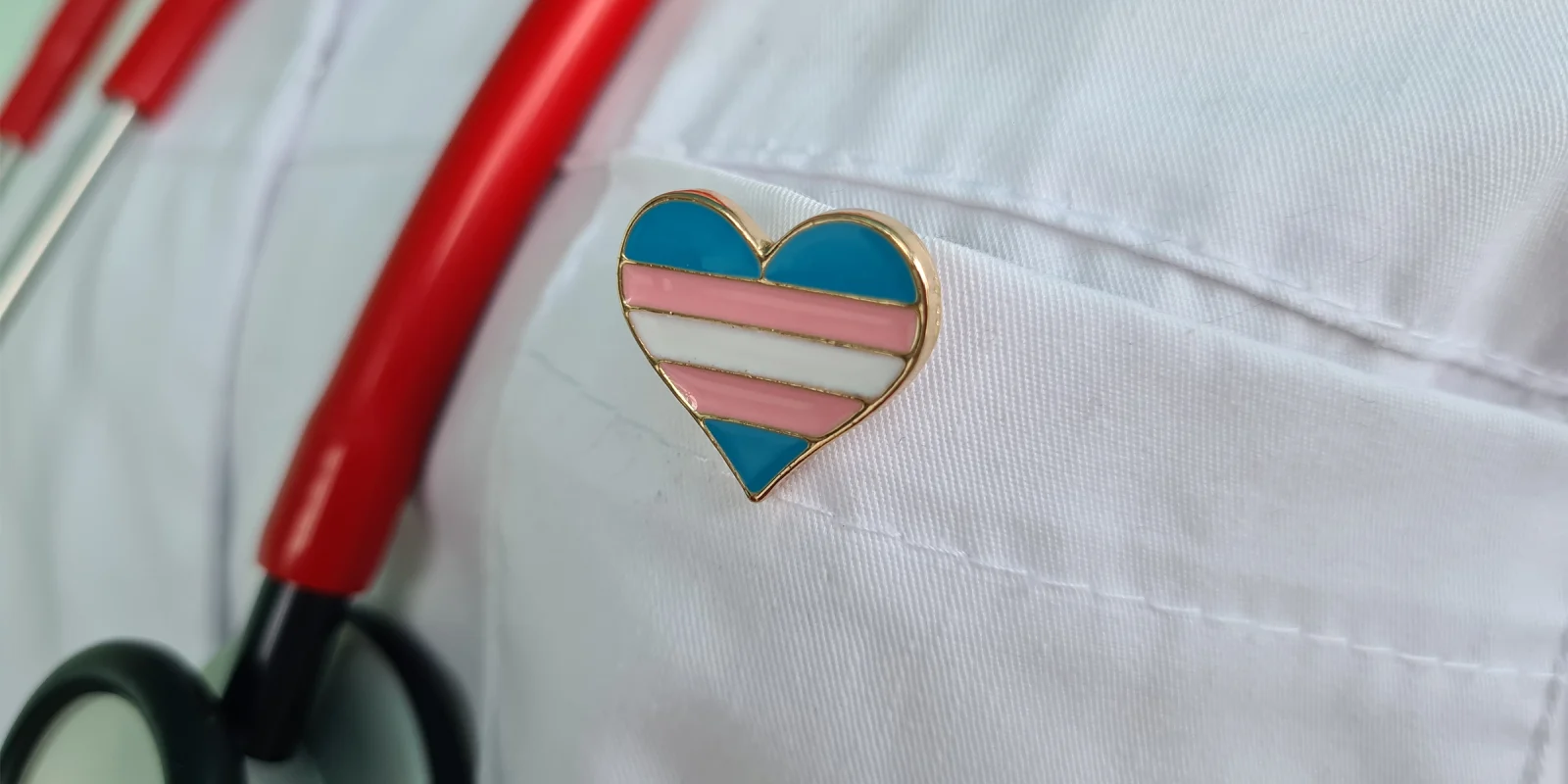Dane Menkin, a family medicine NP at Main Line Health in the Philadelphia area, has somewhat of a novel title: Director of LGBTQ Services. Though LGBTQ medical training is lacking in the U.S., NP Menkin has built a career in the area; roughly 80% of the patients he sees on a daily basis are transgender and nonbinary, while the other 20% fall somewhere under the LGBTQ umbrella.
NP Menkin’s interest in LGBTQ care began more than a decade ago, before he became an APP. As a nurse working in Philadelphia, he volunteered with a syringe exchange program that provided hepatitis B vaccinations and discovered through the work that “there are a lot of transgender people that use the syringe exchange for needles for hormones.” Following this introduction to the trans community, NP Menkin spent 10 years at Mazzoni Center, an LGBTQ center in the city, working as a clinician and honing his leadership skills. Today, much of NP Menkin’s time is spent on two endeavors in particular: providing gender-affirming hormone care to trans and nonbinary patients, both through Main Line and through an online startup, and instructing other clinicians on how to provide such care — and more general LGBTQ care — themselves.
Reflecting on his career, NP Menkin acknowledges that such dedication to LGBTQ health is something of a rarity among clinicians: “I think it says a lot that my position doesn't exist elsewhere in the city. … And there's a lot of health systems in this area.” The reason for this lack, he speculates, is that “there’s really no formal education for LGBTQ care.” Indeed, research has shown that medical education on the topic is poor: In a 2018 study of seven medical schools, more than 50% of student respondents indicated that their curriculum “neither adequately covers nor adequately prepares” students to serve this population. Additionally, a 2017 survey of students at a Boston medical school found that both LGBTQ and non-LGBTQ students reported significantly less “knowledge and comfort regarding transgender or intersex health in comparison to that of LGB.” In response to this educational gap, NP Menkin has made it his mission to bring more clinicians into the fold, both by partnering with local schools to take APP students on clinical rotations and teach them clinical care, and by helping interested practices implement an LGBTQ care curriculum he created.
Not everyone is on board with providing LGBTQ care, however. Concerns about the effects of transition on children and, lately, even adults, have hampered efforts to treat the trans population in certain states. Furthermore, a lack of understanding about gender-affirming hormones has created a misconception among clinicians that the process of providing such hormones is inordinately complex. Speaking to this latter point, NP Menkin says: “It's where the trans nonbinary stuff [comes in that things] start to get a little dicey. I found a lot of providers … who are comfortable taking care of transgender people, either in their specialty, e.g., they’re pulmonologists, or in their day-to-day primary care. What they're not comfortable doing is evaluating them and starting them on hormones. That seems to be like a hard line for people.”
In reality, NP Menkin explains, “This isn’t complicated medicine by any stretch.” To prove his point, he adds, “I get asked once in a while, ‘Who's the endocrinologist that you work with?’ Or, ‘What endocrinologist does this in your system?’ And my answer is always: ‘They send their patients to me.’”
For NP Menkin, then, LGBTQ care “firmly belongs in primary care.” Indeed, he sees the care he provides to this population in the FM setting as akin to traditional FM care: “I think [LGBTQ care] means basic care for anybody regardless of them being LGBTQ,” he says. More specifically, he adds, LGBTQ care means “finding out what makes that person unique in their health and in their risk. Are you at a higher risk for abuse, for substance misuse, for tobacco use, for losing your job, for contracting a sexually transmitted infection? Are you at a lower risk for getting adequate care and supportive care and the things that you need?” In NP Menkin’s view, LGBTQ care can be defined as simply limiting access to negative outcomes and enhancing access to positive ones.
Furthermore, NP Menkin believes that PCPs are well-positioned to provide LGBTQ care because the needs of the LGBTQ population are holistic. An infectious disease physician might be able to prescribe PrEP, he offers as an example, but it’s the PCP who engages the patient in the conversation about anal health. “It doesn't operate in a vacuum,” he explains. “So it's worked out really well to keep [LGBTQ care] housed in primary care and to let people self-identify as clinicians that want to take this on.”
For clinicians who are interested in caring for this population, NP Menkin has a bevy of tips and talking points.
First, he asserts the importance of visual cues in the clinic space that signify LGBTQ affirmation and acceptance. Offices should display items like pronoun badges and rainbow imagery, and supply gender-neutral bathrooms, he suggests. “That kind of [visual language] trickles down.”
Second, he encourages clinicians to solicit and act upon feedback via patient surveys. In his own clinic, receipt of negative feedback induces a proactive response. “We meet with the relevant people,” he says. “If [the issue] was in radiology, we meet with those relevant partners to talk to them about what went wrong, what happened. Is it really just a matter of, do we need to change signage? Is it that since I was there and trained your support staff three years ago, you've had a complete turnover? Is it really just something that's simple? And often it is.”
Third, NP Menkin advises that clinicians learn to initiate conversations about patients’ sex lives — something that can benefit cis-hetero patients as well. In the curriculum that he offers to practices, he not only covers PEP and PrEP and HIV prevention, he teaches clinicians “how to become comfortable talking to their patients about sex and sexual activity.”
From NP Menkin’s perspective, a non-cisheteronormative understanding of sex and sexuality is vital to ensuring the health of the general population. For instance, he explains, a clinician might encounter a man in a heterosexual marriage and assume that the man is monogamous, but it may be the case that man has male partners and is thus at greater risk for HIV. Without engaging patients in nuanced conversations about sexual health, NP Menkin explains, patients’ care needs might go untreated. “We do such a lousy job training medical and advanced practice providers about sexual and reproductive health and getting comfortable talking about different ways to have sex than ‘one person has a penis, one person has a vagina and that's just how it works all the time,’” NP Menkin says. “We really miss a lot by not getting much more granular with patients.”
For clinicians engaged in treating LGBTQ patients, the work can come with significant rewards. NP Menkin shares, “I like to be active and I like to be challenged and busy. And this is a population that for better or worse has a lot of needs that I can meet.” In addition, for NP Menkin at least, patient retention among this population is high: He explains that he’s in the process of moving branches within Main Line, but “95% of my patients are coming with me.”
Finally, and most importantly, the work has a significant impact on the patients themselves. “The sort of more subtle things that I find rewarding [about the job] are the feedback that you get from people,” NP Menkin says. “To me, I'm just doing my job, but to that person, it's been perceived as saving their life.”
Illustration by Getty Images







